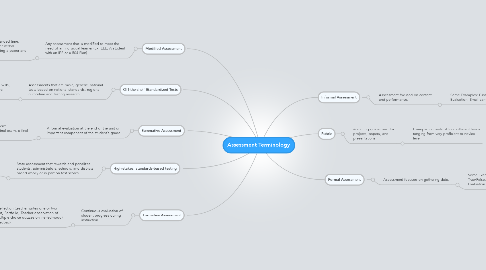
1. Informal Assessment
1.1. Assessment focused on content and performance.
1.1.1. Some Examples: Essays, Portfolios, Subjective Evaluation, Small sample of tasks, Student-directed
2. Formal Assessment
2.1. Assessment focused on gathering data.
2.1.1. Some Examples: Short answer, Matching, True/False, Multiple Choice, Objective Evaluation
3. Formative Assessment
3.1. Continuous evaluation of student progress during instruction.
3.1.1. Some Examples: Journal reflection (teacher writes one or two sentences), Self-assessment, Portfolio, Teacher observation of student progress, short multiple choice quizzes online (edmodo) that provide immediate feedback
4. Summative Assessment
4.1. A formal evaluation at the end of the unit or important component of the student's grade.
4.1.1. Some Examples: A mid-term exam/trimester exam, a final exam, a final paper/project
5. Rubric
5.1. A scoring guide used for projects, papers, and presentations.
5.1.1. Example: consists of four different levels ranging from very proficient to novice level
6. High-stakes, standards-based testing
6.1. State assessment that rewards and penalizes students, administrators, schools, and districts based wholly or in part on test scores.
6.1.1. Example: ISAT - Illinois Standards Achievement Test
7. Off-the-shelf Standardized Tests
7.1. Assessments that are basic, generic, national tests based on national standards, regional curriculum and testing research.
7.1.1. Some Examples: Iowa Test of Basic Skills, Stanford Achievement Test, and Terra Nova
8. Modified Assessment
8.1. Any assessment that is modified to meet the need of an individual learner (Ex: ELL, A student with an IEP or a 504 Plan).
8.1.1. Examples of such modifications: Extended time, Use of a dictionary, Typing Answers or Verbal Explanation rather than answering using a paper and pencil
